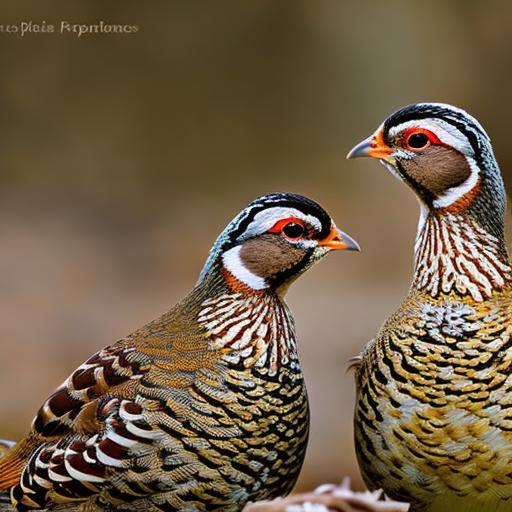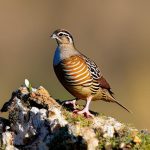Quails are small, ground-dwelling birds that are known for their social behavior and tendency to forage for food in groups. They are often found in grassy areas, agricultural fields, and open woodlands. Quails are primarily herbivores, feeding on seeds, grains, and small insects. They are also known to be attracted to gardens and yards that provide them with easy access to food and shelter. Quails are active during the day and are known to be quite vocal, often communicating with each other through a series of calls and chirps.
Understanding quails’ behavior is crucial when it comes to deterring them from your garden. By knowing their habits and preferences, you can effectively implement strategies to discourage them from frequenting your property. It’s important to note that quails are skittish birds and are easily startled, so any deterrent methods should be non-harmful and humane.
Quails are also known for their nesting habits, often building their nests on the ground in hidden, secluded areas. This means that they may be attracted to overgrown or cluttered areas in your garden where they can find cover and protection. By understanding these behaviors, you can take proactive steps to make your garden less appealing to quails and encourage them to seek food and shelter elsewhere.
Key Takeaways
- Quails are ground-dwelling birds that are attracted to gardens with open spaces and low-lying vegetation.
- Physical barriers such as fences and netting can effectively deter quails from entering and damaging gardens.
- Natural deterrents like predator decoys, motion-activated sprinklers, and reflective objects can help keep quails away from gardens.
- Scare tactics such as loud noises, sudden movements, and visual deterrents can startle quails and discourage them from returning to gardens.
- Removing food sources like fallen fruits, seeds, and insects can make gardens less attractive to quails.
- Keeping gardens tidy by regularly removing debris and maintaining a well-kept landscape can help discourage quails from nesting and foraging in the area.
- If quail infestations persist, seeking professional help from pest control experts or wildlife management professionals may be necessary.
Creating Physical Barriers
One effective way to deter quails from entering your garden is by creating physical barriers that prevent them from accessing the area. This can be achieved by installing fencing or netting around the perimeter of your garden. The fencing should be at least 2 feet high and buried several inches into the ground to prevent quails from burrowing underneath it. Additionally, the fencing should have small gaps or holes to prevent quails from squeezing through.
Another option is to use bird netting, which can be draped over plants or entire garden beds to prevent quails from accessing the area. Bird netting is a lightweight and flexible option that can be easily installed and removed as needed. It is important to regularly inspect the fencing or netting for any damage or gaps that may allow quails to enter.
In addition to fencing and netting, you can also use physical barriers such as scare tape or reflective objects to create a visual deterrent for quails. These items can be hung around the garden to create movement and noise, which can startle quails and discourage them from entering the area.
Using Natural Deterrents
In addition to physical barriers, natural deterrents can also be effective in deterring quails from your garden. One natural deterrent is the use of predator decoys, such as plastic owls or snakes, which can create the illusion of a threat to quails. These decoys should be moved regularly to prevent quails from becoming accustomed to their presence.
Another natural deterrent is the use of strong-smelling plants or herbs that are known to repel quails. Plants such as lavender, rosemary, and mint emit strong scents that can deter quails from entering the area. These plants can be strategically placed around the garden or in pots near vulnerable plants to create a natural barrier.
Additionally, you can use natural repellents such as garlic or chili pepper spray, which can be sprayed on plants or around the perimeter of the garden to deter quails. These natural repellents are non-toxic and safe for use around plants and pets, making them an environmentally friendly option for deterring quails.
Implementing Scare Tactics
Scare tactics can be an effective way to deter quails from your garden by creating a sense of danger or discomfort for the birds. One common scare tactic is the use of noise-making devices such as wind chimes, bells, or even a radio set to a talk station. These noises can startle quails and discourage them from entering the area.
Another scare tactic is the use of motion-activated sprinklers or lights that are triggered when quails approach the garden. The sudden burst of water or light can startle quails and encourage them to seek food and shelter elsewhere. It’s important to regularly move these devices around the garden to prevent quails from becoming accustomed to their location.
You can also use visual scare tactics such as scarecrows or scare balloons that feature large, intimidating eyes or patterns. These visual deterrents can create a sense of unease for quails and discourage them from entering the area. It’s important to regularly move these visual scare tactics around the garden to prevent quails from becoming accustomed to their presence.
Removing Attractive Food Sources
Quails are attracted to gardens that provide them with easy access to food sources such as seeds, grains, and insects. By removing these attractive food sources, you can discourage quails from frequenting your garden. One way to do this is by regularly cleaning up fallen seeds or fruits from trees and bushes in the garden. This can help reduce the availability of food for quails and encourage them to seek food elsewhere.
Additionally, you can use bird feeders that are designed to prevent access by ground-feeding birds such as quails. These feeders should be elevated off the ground and have mechanisms that prevent spillage of seeds onto the ground. By using these feeders, you can control the availability of food for quails and discourage them from entering the area.
It’s also important to regularly inspect the garden for any potential food sources for quails, such as compost piles or open garbage containers. By removing these attractants, you can make your garden less appealing to quails and encourage them to seek food elsewhere.
Maintaining a Tidy Garden

Maintaining a tidy garden can also help deter quails from frequenting the area by removing potential hiding spots and nesting areas. This can be achieved by regularly mowing the lawn and trimming overgrown bushes and shrubs where quails may seek cover. Additionally, it’s important to remove any clutter or debris from the garden that may provide hiding spots for quails.
It’s also important to keep the garden free of standing water, as this can attract quails and other birds looking for a water source. By regularly emptying bird baths or containers that collect water, you can discourage quails from entering the area.
In addition to maintaining a tidy garden, it’s important to regularly inspect the perimeter of the garden for any potential entry points for quails. This can include gaps in fencing or netting, as well as areas where quails may be able to burrow underneath barriers. By regularly inspecting and maintaining these barriers, you can prevent quails from accessing the garden.
Seeking Professional Help
If you have tried various deterrent methods and are still experiencing issues with quails in your garden, it may be time to seek professional help. A pest control expert or wildlife management professional can provide additional insight and assistance in deterring quails from your property.
These professionals can assess your specific situation and recommend tailored solutions for deterring quails based on their behavior and habits in your area. They may also be able to provide additional deterrent methods such as sonic devices or chemical repellents that are safe and effective for deterring quails.
In some cases, professional help may also involve trapping and relocating quails away from your property. This should only be done by trained professionals who understand local regulations and guidelines for trapping and relocating wildlife.
Overall, seeking professional help can provide peace of mind and effective solutions for deterring quails from your garden in a safe and humane manner.
In conclusion, understanding quails’ behavior is crucial when it comes to deterring them from your garden. By knowing their habits and preferences, you can effectively implement strategies such as creating physical barriers, using natural deterrents, implementing scare tactics, removing attractive food sources, maintaining a tidy garden, and seeking professional help if needed. By taking proactive steps to make your garden less appealing to quails, you can encourage them to seek food and shelter elsewhere while protecting your plants and property.
Certainly! Here’s the paragraph with the related article included as an tag:
If you’re looking for ways to keep quails out of your garden, you may also be interested in learning about how long it takes for chicken eggs to hatch naturally. Understanding the incubation process can provide valuable insights into poultry breeding. Check out this informative article on how long for chicken eggs to hatch naturally to expand your knowledge on this fascinating aspect of poultry care.
FAQs
What are quails and why do they enter gardens?
Quails are small, ground-dwelling birds that are known to enter gardens in search of food, such as seeds, insects, and small plants. They are attracted to gardens because of the availability of food and shelter.
What are some effective methods to keep quails out of the garden?
Some effective methods to keep quails out of the garden include using physical barriers such as fences or netting, using scare tactics such as decoys or noise-making devices, and removing food sources that attract quails to the garden.
Are there any natural deterrents that can be used to keep quails out of the garden?
Yes, there are natural deterrents that can be used to keep quails out of the garden, such as planting certain types of plants that quails find unappealing, using natural predators like cats or dogs, and creating an environment that is less attractive to quails by reducing hiding spots and shelter.
Is it legal to harm or kill quails to keep them out of the garden?
It is important to check local laws and regulations regarding the harming or killing of quails, as they are protected in many areas. It is generally recommended to use non-lethal methods to deter quails from the garden.
What are some common mistakes to avoid when trying to keep quails out of the garden?
Some common mistakes to avoid when trying to keep quails out of the garden include using harmful chemicals or poisons, neglecting to regularly maintain and repair physical barriers, and not addressing the root cause of the quail infestation, such as the availability of food sources.
Meet Walter, the feathered-friend fanatic of Florida! Nestled in the sunshine state, Walter struts through life with his feathered companions, clucking his way to happiness. With a coop that’s fancier than a five-star hotel, he’s the Don Juan of the chicken world. When he’s not teaching his hens to do the cha-cha, you’ll find him in a heated debate with his prized rooster, Sir Clucks-a-Lot. Walter’s poultry passion is no yolk; he’s the sunny-side-up guy you never knew you needed in your flock of friends!







